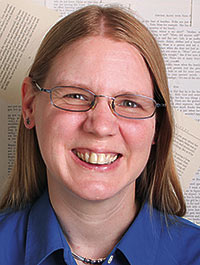Geoff Ryman: Maximum Change
 Geoffrey Ryman was born in Canada, moved to the US when he was 11, and earned degrees in English and history at UCLA. In 1973 he relocated to the UK. His first SF story was ‘‘The Diary of a Translator’’ (New Worlds) in 1976, but he became well known following publication of novella ‘‘The Unconquered Country’’ in 1984. The story won a World Fantasy Award and a British SF Award, and was expanded to novel length in 1986. Four of his novellas were collected in Unconquered Countries (1994), and much of his short work was collected in Paradise Tales and Other Stories (2011).His first novel was quest fantasy The Warrior Who Carried Life (1985), followed by Arthur C. Clarke and Campbell Memorial Award winner The Child Garden (1989). Was (1992), his meditation on L. Frank Baum’s Oz books, was a World Fantasy Award finalist. His online book 253 (1997) was one of the first hypertext novels, and the 1998 print version won a Philip K. Dick Award. His SF novel Air (2004) won Clarke, Sunburst, Tiptree, and British SF Awards. Other genre books include satirical fantasy Lust (2001) and SF novella V.A.O. (2002). His most recent novel is The King’s Last Song (2006), a mainstream work about Cambodia.
Geoffrey Ryman was born in Canada, moved to the US when he was 11, and earned degrees in English and history at UCLA. In 1973 he relocated to the UK. His first SF story was ‘‘The Diary of a Translator’’ (New Worlds) in 1976, but he became well known following publication of novella ‘‘The Unconquered Country’’ in 1984. The story won a World Fantasy Award and a British SF Award, and was expanded to novel length in 1986. Four of his novellas were collected in Unconquered Countries (1994), and much of his short work was collected in Paradise Tales and Other Stories (2011).His first novel was quest fantasy The Warrior Who Carried Life (1985), followed by Arthur C. Clarke and Campbell Memorial Award winner The Child Garden (1989). Was (1992), his meditation on L. Frank Baum’s Oz books, was a World Fantasy Award finalist. His online book 253 (1997) was one of the first hypertext novels, and the 1998 print version won a Philip K. Dick Award. His SF novel Air (2004) won Clarke, Sunburst, Tiptree, and British SF Awards. Other genre books include satirical fantasy Lust (2001) and SF novella V.A.O. (2002). His most recent novel is The King’s Last Song (2006), a mainstream work about Cambodia.
Ryman is a founder and proponent of the Mundane SF movement, which eschews tropes like alien visitors, time travel, and faster-than-light propulsion in favor of rigorously extrapolated, realistic SF. He guest edited a special Mundane SF issue of Interzone in 2008, co-edited anthology Tesseracts Nine (2005), and edited SF anthology When It Changed (2010).
Ryman lives in London with his partner of 35 years. He was a longtime employee of the British government, and now teaches writing at the University of Manchester.
Wikipedia: Geoff Ryman
“Mundane SF is set on Earth or the nearby solar system. It was based on a few simple rules, no time travel, no aliens – it’s total social change. Mundanity is about change. You can’t have all super hyper flying between star systems and not have social change. The reason TV science fiction is so disappointing is that if they followed the advice of their scientific consultants they’d have to reimagine the whole social background, and they’re not willing to do that for a popular audience. So there are still fighter pilots and hierarchical military discipline on Battlestar Galactica.
 “Mundane SF may be over as a functional movement, but if you look at the submission guidelines to some journals, they now say, ‘Please don’t make space travel as easy as it is on TV.’ There are two reasons for mundanity. The good-faith argument says, ‘This is supposed to be science fiction; let’s stick to the rules a bit more.’ But the other one was the moral argument, that when the science gets twisted too much, you can end up sending strange messages or creating metaphors with unintended readings. You end up with peculiar moral messages like, ‘It’s OK. We can burn through this planet and then fly off to another one.’ Or Aliens the sequel. Ripley would have signed knowing she’d never be back for her 11-year-old daughter’s birthday. But in this sequel she’s shocked to lose her daughter, and it’s her outraged maternal instinct which drives the story and its subtext, paralleling Ripley with the Alien queen. Feminists are aliens? That was surely not the intention.
“Mundane SF may be over as a functional movement, but if you look at the submission guidelines to some journals, they now say, ‘Please don’t make space travel as easy as it is on TV.’ There are two reasons for mundanity. The good-faith argument says, ‘This is supposed to be science fiction; let’s stick to the rules a bit more.’ But the other one was the moral argument, that when the science gets twisted too much, you can end up sending strange messages or creating metaphors with unintended readings. You end up with peculiar moral messages like, ‘It’s OK. We can burn through this planet and then fly off to another one.’ Or Aliens the sequel. Ripley would have signed knowing she’d never be back for her 11-year-old daughter’s birthday. But in this sequel she’s shocked to lose her daughter, and it’s her outraged maternal instinct which drives the story and its subtext, paralleling Ripley with the Alien queen. Feminists are aliens? That was surely not the intention.
‘‘Drama is about change. In science fiction, we have the potential to be the most dramatic popular genre, because we potentially are writing about real social change: about the death of everything you believe in, everything you thought you knew. In my lifetime, there has been a complete change in how people view relationships.”
…
 “The anthology I edited back in 2009, When It Changed, was named after a Joanna Russ story where she used the immensity of space to give a culture time to grow and develop in isolation. There are no infodumps, and the story wasn’t beholden to an ideology. The ending phrase opens the whole story out into a contemplation of time and the certainty of change: For-A-While. This is SF of the highest order, but I can teach it to mainstream students with no sense that they don’t get the SF elements. It’s just a story about a culture at that moment of maximum change, and it’s brilliant. At the time it was published Joanna’s novel We Who Are About To… was made to sound like it was a ‘let’s shoot men’ novel, but it’s trying to get science fiction to look death in the face. Suns die, galaxies die. We’re not immortal as individuals or as a species. At its core, a good deal of this genre is about immortality and individual immortality. Russ’s novel just asked why do we want to be immortal?”
“The anthology I edited back in 2009, When It Changed, was named after a Joanna Russ story where she used the immensity of space to give a culture time to grow and develop in isolation. There are no infodumps, and the story wasn’t beholden to an ideology. The ending phrase opens the whole story out into a contemplation of time and the certainty of change: For-A-While. This is SF of the highest order, but I can teach it to mainstream students with no sense that they don’t get the SF elements. It’s just a story about a culture at that moment of maximum change, and it’s brilliant. At the time it was published Joanna’s novel We Who Are About To… was made to sound like it was a ‘let’s shoot men’ novel, but it’s trying to get science fiction to look death in the face. Suns die, galaxies die. We’re not immortal as individuals or as a species. At its core, a good deal of this genre is about immortality and individual immortality. Russ’s novel just asked why do we want to be immortal?”
…
“My big problem with writing new work is that I made the mistake of going into British education, and it’s taking up all my time. I think it’s because you cannot teach people to write unless you put as much into their work as you put into your own. But you really can teach people how to write. I can take undergraduates who have poor prose style, and at the end of year two they have a prose style; at the end of year three, they’re smooth. It’s like bringing the Clarion system into university. The peer-critiquing is where a lot of the learning happens, looking at what each other are doing and learning from them. As simple as that.”
…
“As SF people, we’re so used to having to defend ourselves, I sometimes wonder if it means we are defensive or overpraise ourselves. I actually think science fiction is a much nicer place for a writer to be than the mainstream, because of that collegiality – that wonderful sense of, ‘Your success is my success.’ But on the other hand, it does sometimes mean that we close ranks and defend ourselves when outsiders have a valid point.”


 Excerpts from the interview:
Excerpts from the interview:


